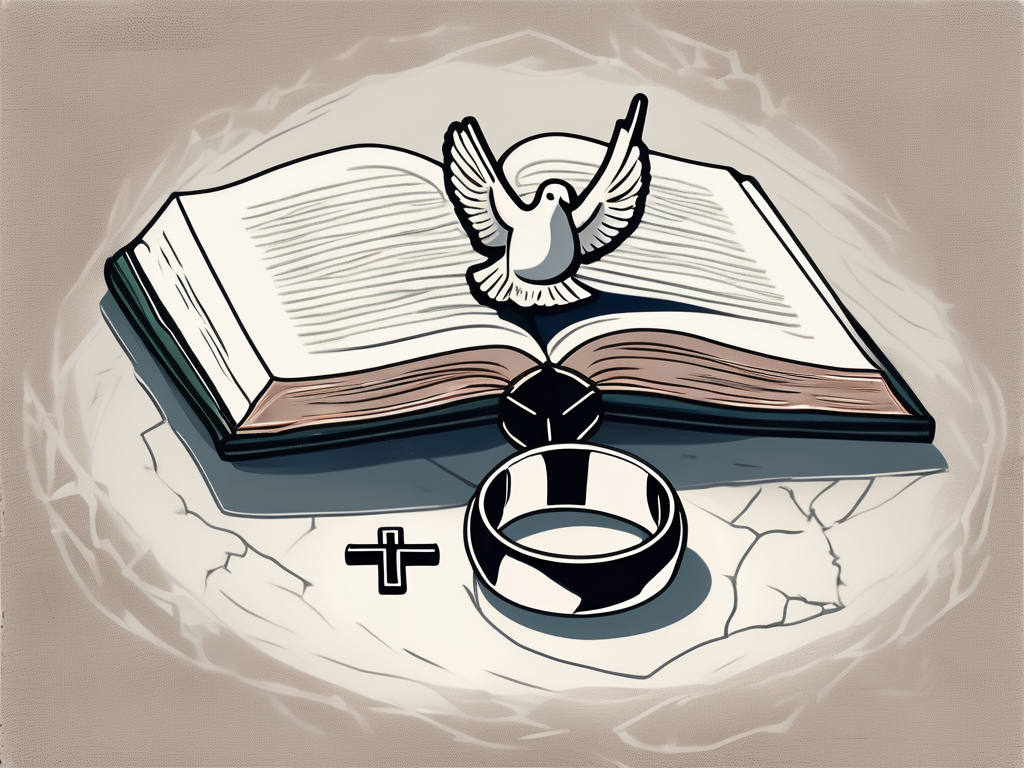Do you find yourself wondering about divorce and what the Bible says about it? Well, you’ve come to the right place. In this article, we will explore the concept of divorce in the biblical context and delve into different interpretations of its teachings. We will also examine the role of the church in dealing with divorce and remarriage while discussing the Bible’s guidance for coping with such life-altering experiences.
Understanding the Concept of Divorce in Biblical Context
Divorce is undeniably a complicated and sensitive topic. To truly grasp what the Bible says about it, we must dig into its historical and cultural context. By examining various biblical passages, we can gain a deeper understanding of how divorce was viewed and treated.
The Old Testament and Divorce
In the Old Testament, divorce was not explicitly prohibited. However, it was governed by regulations laid out in the Mosaic Law. Divorce was allowed in cases of adultery, neglect, or abuse. Nonetheless, marriage was seen as a sacred covenant that God intended to be lifelong.
Let’s take a closer look at the regulations surrounding divorce in the Old Testament. In the book of Deuteronomy, chapter 24, verses 1-4, it is stated that if a man finds “some indecency” in his wife, he may write her a certificate of divorce and send her away. This suggests that divorce was permitted in cases where the wife had committed an act that violated the marriage covenant.
However, it is important to note that divorce was not encouraged or taken lightly in the Old Testament. The prophet Malachi, in chapter 2, verse 16, states that God hates divorce. This indicates that divorce was not in alignment with God’s ideal plan for marriage.
The New Testament and Divorce
In the New Testament, Jesus reaffirmed the sanctity of marriage, emphasizing that divorce was not part of God’s original plan. He taught that divorce should occur only in cases of adultery, considering it a breach of the marital commitment. Jesus urged forgiveness and emphasized the importance of reconciliation.
One of the key passages in the New Testament regarding divorce is found in the Gospel of Matthew, chapter 19, verses 3-9. Here, the Pharisees questioned Jesus about divorce, and he responded by pointing them back to the creation account in Genesis. Jesus stated that God created male and female to become one flesh, and what God has joined together, no one should separate.
Jesus’ teachings on divorce were radical for his time, as divorce was relatively common and accepted in Jewish society. He emphasized the importance of honoring the marriage covenant and encouraged couples to work through their differences rather than resorting to divorce.
It is essential to note that while Jesus taught against divorce, he also showed compassion and understanding towards those who had experienced it. In the Gospel of Mark, chapter 10, verses 10-12, Jesus acknowledges that divorce happens due to the hardness of people’s hearts. He recognizes the pain and brokenness that can result from divorce.
Overall, the biblical perspective on divorce is complex. While divorce was allowed in certain circumstances, it was not viewed as God’s ideal plan for marriage. The Bible encourages forgiveness, reconciliation, and a commitment to the sacred covenant of marriage.
Different Interpretations of Biblical Teachings on Divorce
Within Christianity, there is a range of interpretations regarding divorce. Some interpretations lean towards a conservative standpoint, adhering strictly to the biblical teachings, while others take a more liberal approach, considering the context and applying grace and understanding.
When examining the conservative interpretations, it becomes evident that they emphasize the biblical prohibition of divorce, except in cases of adultery. They firmly believe that marriage is a sacred covenant between a man and a woman, and divorce should only be considered when one partner has been unfaithful. These individuals advocate for the restoration of broken marriages, prioritizing reconciliation and forgiveness. For them, divorce should be a last resort, with every effort made to salvage the relationship.
On the other hand, the liberal interpretations of biblical teachings on divorce take a more contextual approach. These individuals believe that while marriage is indeed a sacred bond, there are circumstances where divorce may be necessary for the well-being and safety of individuals involved. They consider factors such as abuse, abandonment, and irreconcilable differences as valid grounds for divorce.
Liberal interpreters of biblical teachings on divorce firmly believe in God’s grace and the freedom to make choices that promote healing and personal well-being. They argue that divorce, in certain situations, can be a means of finding peace and allowing individuals to move forward in their lives. They emphasize the importance of considering the emotional and physical well-being of individuals involved, especially in cases where the marriage has become toxic or harmful.
It is important to note that both conservative and liberal interpretations of biblical teachings on divorce are rooted in a desire to understand and follow God’s will. While they may differ in their approach, both interpretations seek to navigate the complexities of human relationships and uphold the values of love, forgiveness, and compassion.
The Role of the Church in Divorce
Throughout history, the church has played a significant role in dealing with divorce and remarriage. Let’s explore how different denominations perceive and handle these complex matters.
Divorce is a topic that has long been debated and discussed within religious circles. The church, as a spiritual institution, has often been seen as a moral authority on matters of marriage and family. Its teachings and beliefs on divorce have had a profound impact on the lives of individuals and communities.
When it comes to the role of the church in divorce, one denomination that stands out is the Catholic Church. The Catholic Church views marriage as a sacrament and divorce as a violation of that sacred bond. Therefore, they do not recognize divorce as the dissolution of a valid marriage. Instead, annulment is an option in cases where it is determined that the marriage was invalid from the beginning.
An annulment, in the eyes of the Catholic Church, declares that a marriage never truly existed due to factors such as lack of consent, impotence, or fraud. It is a complex and often lengthy process that involves a thorough investigation by a church tribunal. The Catholic Church’s stance on divorce reflects its belief in the indissolubility of marriage and the importance of upholding the sacredness of the marital bond.
On the other hand, Protestant churches have a more varied approach to divorce. While some hold a similar view to the Catholic Church, advocating for the sanctity of marriage and discouraging divorce, others are more open to divorce and remarriage under certain circumstances. The specific beliefs and practices of each denomination differ greatly, reflecting the diversity within Protestantism.
Some Protestant denominations, like the Anglican Church, have developed their own processes for granting divorce and allowing for remarriage. They may require a period of separation or counseling before granting a divorce, and they often have guidelines for determining when remarriage is appropriate.
Other Protestant churches, such as certain branches of the Methodist and Presbyterian traditions, take a more lenient approach to divorce. They may view divorce as a regrettable but necessary option in cases of abuse, infidelity, or irreconcilable differences. These churches often emphasize the importance of forgiveness, healing, and the possibility of finding love and happiness in a second marriage.
It is important to note that the church’s role in divorce extends beyond theological teachings. Many churches provide support and counseling services to individuals and couples going through the challenges of divorce. They offer a safe space for individuals to share their experiences, seek guidance, and find solace in their faith community.
Overall, the role of the church in divorce is a complex and multifaceted one. Different denominations have different perspectives and approaches, reflecting the diverse beliefs and values within Christianity. While some emphasize the sanctity of marriage and discourage divorce, others recognize the realities of human relationships and provide support for individuals navigating the difficult process of divorce.
Divorce, Remarriage, and the Bible
As we navigate the complexities of divorce, questions often arise concerning remarriage. Let’s explore the biblical guidelines for remarriage and gain insight into how the Bible addresses this issue.
Divorce is a sensitive topic that has been debated for centuries. It is important to approach this subject with an open mind and a willingness to delve into the depths of biblical teachings. The Bible offers guidance and wisdom on various aspects of life, including divorce and remarriage.
Biblical Guidelines for Remarriage
Biblical guidelines around remarriage differ based on interpretations. Some believe that remarriage is forbidden after divorce, considering it adultery. Others interpret the Bible to allow for remarriage in cases where divorce occurred due to adultery or abandonment.
One interpretation suggests that remarriage is only permissible if the divorce was a result of adultery committed by one of the spouses. In this view, the innocent party is released from the marriage bond and is free to remarry. However, it is important to note that not all biblical scholars agree on this interpretation.
Another perspective argues that remarriage is acceptable in cases where abandonment has occurred. This view suggests that if one spouse abandons the other, leaving them without any hope of reconciliation, the abandoned party is not bound by the marriage covenant and is therefore free to remarry.
It is essential to approach these interpretations with caution and seek guidance from trusted religious leaders and scholars who have studied the Bible extensively. The complexity of the issue requires careful consideration and a deep understanding of the biblical teachings.
The Concept of Adultery in the Context of Divorce and Remarriage
In the context of divorce and remarriage, the concept of adultery is significant. Adultery is seen as the violation of the marital commitment and undermines the foundation of trust. Understanding adultery’s implications helps guide interpretations regarding remarriage after divorce.
Adultery is not limited to physical acts of infidelity but also encompasses emotional and mental unfaithfulness. It is a breach of the sacred bond between spouses and can have devastating effects on the individuals involved and the overall health of the marriage.
When considering remarriage after divorce, the concept of adultery plays a crucial role. Some argue that remarriage is only permissible if the divorce occurred due to adultery, as it is believed that the innocent party should not be punished for the actions of their spouse.
However, others argue that remarriage should be allowed in cases where the divorce was a result of abandonment. They believe that the abandoned party should not be condemned to a life of loneliness and should have the opportunity to find love and companionship once again.
It is important to remember that these interpretations are not universally agreed upon and may vary depending on cultural, religious, and personal beliefs. The Bible provides a foundation for understanding the complexities of divorce and remarriage, but ultimately, the decision lies with the individuals involved and their faith communities.
The Bible’s Guidance for Coping with Divorce
Divorce is undoubtedly a challenging and emotionally tolling experience. However, the Bible provides guidance and comfort for those going through it. Let’s explore biblical principles that can aid individuals in coping with divorce and finding renewal.
Finding Comfort in Scripture During Divorce
During divorce, turning to scripture can provide solace and strength. Verses that emphasize God’s love, grace, and faithfulness become pillars of support. They remind us that even in the midst of pain, God is with us and offers hope for the future.
One such verse that brings comfort is found in Psalm 34:18, which says, “The Lord is close to the brokenhearted and saves those who are crushed in spirit.” This verse reassures individuals that God is near, ready to offer comfort and healing during this difficult time. It reminds them that they are not alone in their pain.
Another verse that offers encouragement is Isaiah 41:10, which states, “So do not fear, for I am with you; do not be dismayed, for I am your God. I will strengthen you and help you; I will uphold you with my righteous right hand.” This verse reminds individuals that God is their source of strength and support. It encourages them to trust in His presence and rely on His guidance as they navigate the challenges of divorce.
Biblical Principles for Life After Divorce
Life after divorce can be a new beginning filled with challenges and opportunities for growth. Biblical principles such as forgiveness, love, and self-care guide individuals to heal, rebuild, and cultivate fulfilling lives after divorce.
One important principle for life after divorce is forgiveness. Jesus teaches in Matthew 6:14-15, “For if you forgive other people when they sin against you, your heavenly Father will also forgive you. But if you do not forgive others their sins, your Father will not forgive your sins.” This verse reminds individuals of the importance of forgiving others, including their former spouse, in order to experience true healing and freedom. It encourages them to let go of resentment and bitterness, and instead, choose forgiveness as a path towards healing and restoration.
Love is another crucial principle for life after divorce. In Mark 12:31, Jesus says, “Love your neighbor as yourself.” This commandment reminds individuals to extend love and kindness not only to others but also to themselves. It encourages them to prioritize self-care and self-love, recognizing that they deserve to be treated with compassion and respect. By embracing love as a guiding principle, individuals can create a positive and nurturing environment for their own personal growth and well-being.
Self-care is also emphasized in the Bible as a vital aspect of life after divorce. In 1 Corinthians 6:19-20, it says, “Do you not know that your bodies are temples of the Holy Spirit, who is in you, whom you have received from God? You are not your own; you were bought at a price. Therefore, honor God with your bodies.” This verse reminds individuals of the importance of taking care of themselves physically, emotionally, and spiritually. It encourages them to prioritize their well-being and make choices that honor God and promote their overall health and happiness.
As individuals navigate the challenges of divorce, these biblical principles provide a solid foundation for coping, healing, and finding renewal. By finding comfort in scripture and embracing principles such as forgiveness, love, and self-care, individuals can move forward with hope and resilience, knowing that God is with them every step of the way.
Conclusion
Divorce is a complex topic that the Bible approaches from various angles. Understanding the context, interpretations, and teachings of scripture can help navigate the intricacies surrounding divorce. Regardless of one’s interpretation, the Bible provides guidance, comfort, and principles for healing and renewal during and after divorce.












